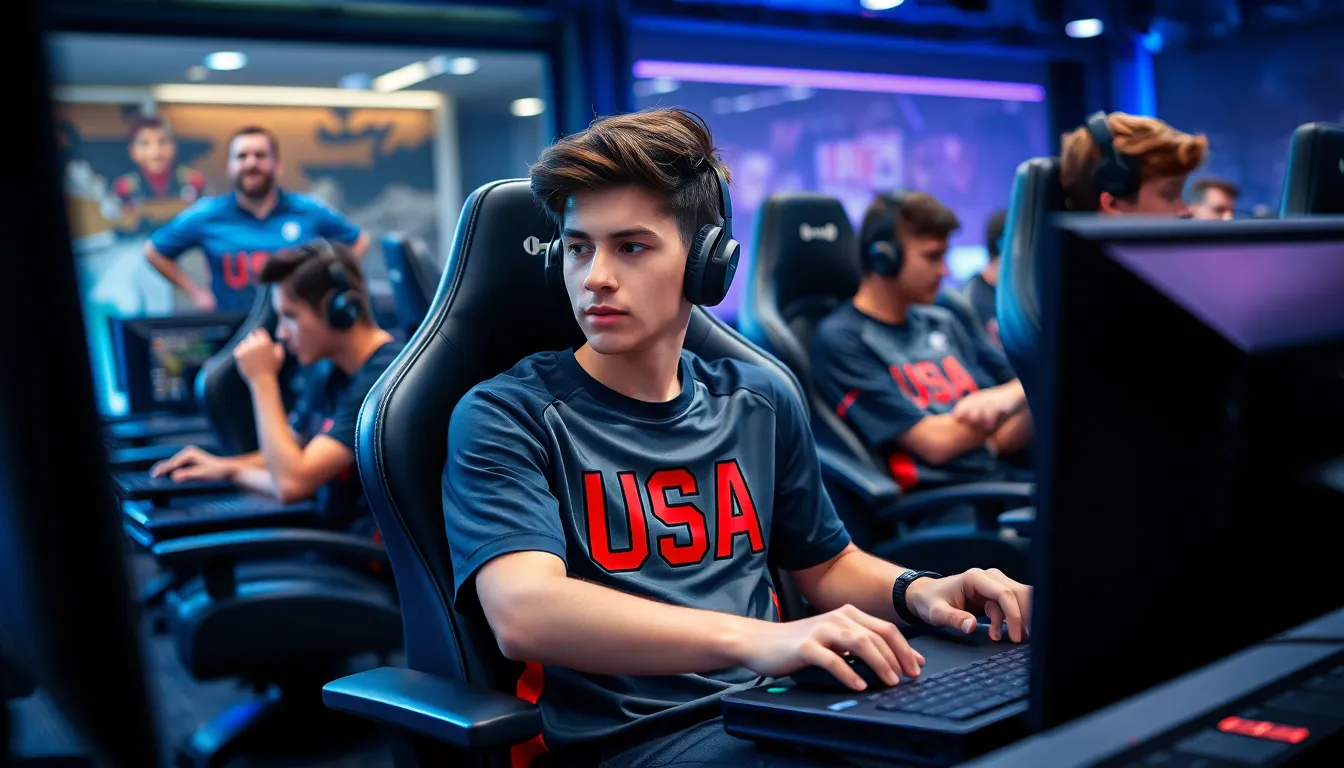In the fast-paced world of esports, training isn’t just about perfecting your aim or mastering that killer combo. It’s a full-on battle plan that could rival any military operation. Players are not just gaming; they’re fine-tuning their mental agility, teamwork, and strategy like a well-oiled machine. Who knew that sitting in front of a screen could be the ultimate path to glory and fame?
But let’s be real: while some might think esports training is all about snacks and energy drinks, it’s actually a rigorous discipline that requires dedication and strategy. Whether you’re a casual gamer dreaming of hitting the big leagues or a seasoned pro looking to level up, understanding the nuances of esports training can be your secret weapon. Dive into this world where passion meets precision, and discover how to turn those gaming skills into a winning formula.
esports training
Esports training encompasses a variety of structured activities aimed at improving a player’s gaming abilities. Training involves not only developing technical skills like aiming precision or executing complex moves but also enhancing physical and mental strength. Players engage in strategic planning sessions to analyze game mechanics and teamwork dynamics.
Group exercises help cultivate communication and cooperation among team members. Mental training techniques, such as visualization and focus exercises, boost performance under pressure. Building stamina through regular physical exercise contributes to overall health, improving reaction times during intense gameplay.
Nutrition plays a crucial role in maintaining energy levels and concentration. Many players follow specific dietary plans to ensure optimal performance. Elements like hydration and sleep also affect cognitive functioning and physical readiness.
Setting short- and long-term goals helps players track their progress. Coaches often guide players in refining their strengths and addressing weaknesses. Constructive feedback from trainers bolsters skill development and fosters a growth mindset.
Practices often mirror those of traditional sports, emphasizing discipline and commitment. Esports teams may conduct multiple training sessions weekly, allowing for sustained improvement and skill mastery. By understanding these facets, both aspiring and seasoned players can appreciate the comprehensive nature of esports training.
Importance of Esports Training

Esports training plays a vital role in honing both gaming and non-gaming skills. This structured approach enhances a player’s overall performance in competitive environments.
Skill Development
Skill development encompasses a variety of elements essential for success in esports. Players focus on improving their technical skills, including aiming accuracy and in-game mechanics. Performance reviews assist in identifying specific areas needing enhancement. Regular practice sessions allow players to work on strategic elements and in-game decision-making. Group exercises foster teamwork and communication, which are crucial for executing strategies effectively. Progress tracking ensures steady improvement, keeping players motivated to meet their goals.
Mental Resilience
Mental resilience stands as a cornerstone of effective esports training. Players learn to handle high-pressure situations through dedicated mental training techniques. Visualization methods enhance focus, aiding in performance consistency during competitions. Coaches encourage players to adopt a growth mindset, which builds confidence and adaptability. Developing emotional control helps in managing stress and maintaining composure amidst intense gameplay. Practicing mindfulness techniques can further strengthen mental endurance, leading to improved decision-making and overall performance.
Types of Esports Training
Esports training includes individual and team approaches, each tailored to enhance specific skills and performance levels.
Individual Training
Individual training focuses on personal skill enhancement. It targets specific areas like reflexes, aiming accuracy, and game mechanics. Players utilize various drills to practice their techniques and improve reaction times. For instance, custom training maps in games offer tailored scenarios to refine skills. Regular self-assessment provides insight into areas of improvement. Additionally, players incorporate mental exercises to boost concentration and decision-making. These practices reinforce an individual’s capability to perform under pressure. Progress tracking ensures that players adapt their training methods based on their evolving strengths and weaknesses.
Team Training
Team training emphasizes collaboration and communication among players. It cultivates teamwork through coordinated strategies and practice matches. Teams participate in scrimmages, simulating real match conditions to develop synergy. Group exercises focus on role-specific skills, enhancing overall team dynamics. Constructive feedback from coaches helps identify areas for team improvement. This collaborative environment builds trust and camaraderie among members. Furthermore, reviewing gameplay footage enables teams to analyze their strategies critically. Consistent training fosters a unified approach, ensuring that every member understands their role during competitions.
Effective Training Techniques
Effective esports training incorporates various methods to enhance player performance and overall competence. Focus areas include analyzing gameplay and engaging in physical conditioning.
Analyzing Gameplay
Analyzing gameplay serves as a crucial part of improving skills. Players review recorded matches to identify mistakes and understand strategies. They track their performance metrics like kills, deaths, and assists, using this data to make informed adjustments. Coaches often provide feedback during these sessions, guiding players to recognize patterns and develop counter-strategies against opponents. Frequent analysis fosters a culture of continuous improvement and helps build tactical awareness, leading to better decision-making in high-pressure scenarios.
Physical Conditioning
Physical conditioning forms another vital component of esports training. Players engage in exercises aimed at enhancing endurance and dexterity, promoting overall wellness. Cardiovascular workouts improve stamina, enabling longer periods of focused play. Strength training targets key muscle groups to reduce the risk of injury. Stretching routines prevent strain and enhance flexibility, crucial for prolonged gaming sessions. Incorporating proper nutrition and hydration is essential, as it supports cognitive function and energy levels. Prioritizing physical health leads to better performance and longevity in the competitive gaming scene.
Conclusion
Esports training is a multifaceted discipline that demands commitment and strategy. By integrating technical skill development with mental resilience and teamwork, players cultivate a competitive edge that extends beyond the screen. This rigorous approach not only sharpens gaming abilities but also fosters essential life skills such as communication and adaptability.
As the esports landscape continues to evolve, the importance of structured training becomes even more apparent. Players who embrace this comprehensive training model are better equipped to face the challenges of competitive gaming. With dedication and the right mindset, they can achieve remarkable success in the fast-paced world of esports.

